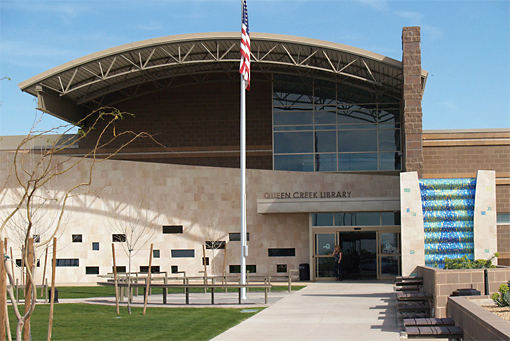| 제목 | [DAIKIN] GOVERNMENT - Queen Creek Library | 작성일 | 16-06-16 14:20 |
| 글쓴이 | 최고관리자 | 조회수 | 4,983 |
본문
CASE STUDY
Recreation
Name
Queen Creek Branch Library and Recreation Annex
Location
Queen Creek, AZ USA
Facility Size
47,000 ft2 facility
Issue
Ability to meet fast-track construction schedule and electricity costs were critical
Solution
Daikin Modular Central Plant with Daikin Magnitude® chiller
Daikin Modular Central Plant Chiller Helps Community Library Earn LEED®
Silver Certification
The ability to meet a fast-track construction schedule and a 30% savings in electricity costs were critical factors in the selection of a Daikin Modular Central Plant for a new community library and recreation center in Queen Creek, Arizona. Those impressive energy savings were in turn a contributing factor in the building's anticipated LEED (Leadership in Energy and Environmental Design) Silver certification by the U.S. Green Building Council. (At the time of this article, the Queen Creek Library was registered as LEED NC 2.2 with the USGBC.)
The Queen Creek Branch Library and Recreation Annex was designed and built through a partnership between the Town of Queen Creek and the Maricopa County Library District. The 47,000 square foot, one-story building houses a library, three meeting rooms and a large recreation center with six classrooms and two multi-purpose rooms in a strikingly modern masonry and steel building. The Daikin Modular Central Plant and cooling tower are situated in an enclosed service yard next to the building.
The Daikin Modular Central Plant (MCP) is a pre-engineered, pre-assembled module that combines a chiller, boiler, cooling tower, pumps and interconnecting condenser water piping. This integral module is a low-cost alternative to site-built central plant that reduces installation time and site assembly time.
Lee Councilor, facilities manager with the Town of Queen Creek, was sold on the Daikin Modular Central Plant featuring Daikin's frictionless chiller with a magnetic bearing centrifugal compressor after visiting an MCP installation nearby.
"When we saw that we could achieve a 30 percent energy savings over traditional plants, choosing a Daikin MCP was a no-brainer. We watched the Daikin plants operating at a Scottsdale high school and saw how they performed fully loaded. After that, we opted for the Daikin central plant with the frictionless chillers rather than a traditional central plant, which would have had an immense energy draw," Councilor says.
When the mechanical contractor, Tri City Mechanical of Chandler, Arizona, joined the project, they saw an immediate opportunity to recommend the Daikin Modular Central Plant. "We were familiar with the Daikin technology on other projects and knew the energy-savings potential for the Queen Creek facility," says Pete Menconi, chief engineer with Tri City Mechanical.
Electrical Costs Savings of 30% a Month
Councilor says the energy savings of the Daikin Modular Central Plant in kilowatt hours over traditional central plants has been impressive. "Since the regular operation of the plant, our average electrical bill is approximately $3,700 per month, representing at least a 30 percent savings over a similar facility with a traditional central plant." He is particularly impressed with the low start-up energy required for the frictionless centrifugal chillers. "We're seeing a large cost reduction over traditional central plants in our community. A traditional chiller has a large startup current, using between 300 and 500 amps. With this unit, it's only 15 to 19 amps."
The HVAC system at Queen Creek uses a four-pipe system. The Daikin Modular Central Plant features a configuration of one Daikin Model WMC frictionless chiller, containing two 75-ton compressors. Councilor says: "With the two compressors, if one happens to go down, we can run the other one and still keep some cooling going. In older systems, you have to take the whole chiller down."
Councilor's facility staff appreciates that the Daikin WMC Chiller's magnetic bearing centrifugal compressor eliminates the need for oil handling equipment, offering savings on maintenance and repair costs compared to traditional centrifugal compressor chillers.
Without the loss of friction suffered in traditional centrifugal compressors chillers, the frictionless chiller is ultra efficient. In addition, the frictionless magnetic-bearing compressors eliminate the metal-to-metal contact noise of conventional bearings, making the Daikin WMC frictionless chiller the quietest centrifugal chiller in the industry with sound power levels as low as 77 dBA per ARI Standard 575.

The Daikin Magnitude Chiller, shown inside the Modular Central Plant, contributed significantly to the energy savings for the Queen Creek Library.
Flexibility a plus
The Daikin plant at the Queen Creek facility contains a sealed combustion boiler which, Councilor says, is a unique aspect of the installation that shows the flexibility of Daikin in designing the plants. "Daikin configured the installation to combine two functions to save space and costs," he says. As a result of utilizing hot-water heat instead of the electric-strip heating in air boxes typically found in many buildings, Queen Creek uses natural gas to the heat the building, further contributing to significant energy savings.
On the installation side, this combination of the boiler and chiller in the Modular Central Plant helped the project stay on schedule. Menconi says: "The containment of the boiler inside the plant allowed for a single installation to equip the heating and cooling. Because the central plant is packaged, the construction schedule was maintained because there's virtually no work to be done once the plant was in place."
Ground broke on the Queen Creek library project in May 2007 and the Daikin Modular Central Plant was installed in June 2008 within a couple of hours. During September 2008, Councilor says the required LEED blowdown was initiated to evacuate VOC (volatile organic compound) emissions from the new building in an intensive ten-day process. The system was fully commissioned in time for the grand opening of the building in November 2008.
"Fantastic comfort"
The Queen Creek library building employs a number of advanced energy conservation techniques to achieve its low operating cost, including air-side economizers, demand ventilation, daylighting and variable air volume.
"The comfort level has been fantastic," Councilor says. "We maintain the building between 74 and 76 degrees and back-set the temperature to 85 degrees at night. Considering winters in Arizona, we're able to bring in fresh air from the outside to cool the building with the air-side economizers. On a typical winter day, the chiller runs at less than 20 percent load."
Integration for additional savings
The Daikin Modular Central Plant is integrated with the library's Alerton® building automation system using BACnet® open standard protocol. Daikin chillers have unit controllers with the Open Choices® feature of selectable communications using LONWORKS®, Modbus® or BACnet. Councilor says the controls for the plant are run remotely from the Queen Creek development services building in an easy-to-use interface on a PC. "The building automation system controls all energy management for our buildings, making it as energy efficient and saving as much time as possible," Councilor says.
All in all, Councilor calls the Daikin chiller technology and hot-water heating contained in the central plant a winning combination. "We're amazed. The energy efficiency is better than we expected." The Queen Creek facilities team will definitely consider similar Daikin technology for replacement of older equipment at other community facilities.
| 이전글 | [DAIKIN] GOVERNMENT - Lewis-Clark State 2016-06-16 | ||
| 다음글 | [DAIKIN] GOVERNMENT - San Francisco Public Utilities Commission Headquarters 2016-06-16 | ||






